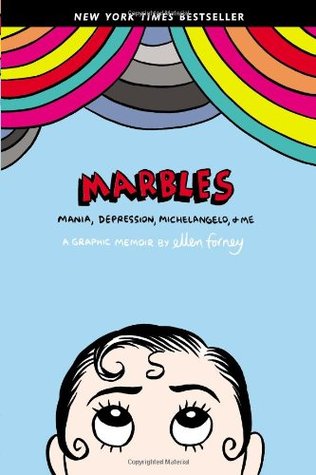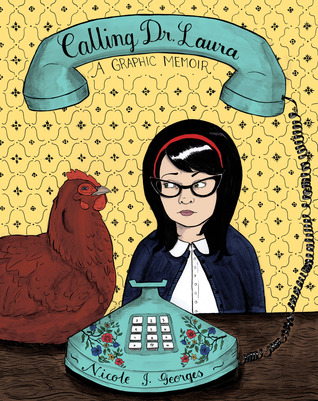Published : 2021 || Format : print || Location : Colombia ☆ ☆ ☆ ☆ ☆ What was it about the country that kept everyone hostage to its fantasy? The previous month, on its own soil, an American man went to his job at a plant and gunned down fourteen coworkers, and last spring alone there were four different school shootings. A nation at war with itself, yet people still spoke of it as some kind of paradise.. Thoughts : Infinite Country follows two characters - young Talia, who at the beginning of this book, escapes a girl’s reform school in North Colombia so that she can make her previously booked flight to the US. Before she can do that, she needs to travel many miles to reach her father and get her ticket to the rest of her family. As we follow Talia’s treacherous journey south, we learn about how she ended up in the reform school in the first place and why half her family resides in the US. Infinite Country tells the...
Marbles by Ellen Forney
 Marbles is a super important book for everyone to read because
Marbles is a super important book for everyone to read because1. it is a memoir,
2. it is a graphic memoir (so you see the world from the artist's eyes), and
3. it is a book about how the author realized she was bipolar and how she battled it.
Honestly, you have to read it to appreciate it. Although the beginning of the book felt like being thrown into a wild roller-coaster ride without really having the time to understand what was happening, I loved that it was also a reflection of the author's true nature. Ellen has a wild personality, when she is manic, which she is when the book starts. She is an unimaginable bundle of energy who has a zillion ideas about what to do and what projects to start and what parties to plan. It is exhausting just watching how she spends her time. Her social worker recommended that she meet a psychiatrist and that is when she learns that she is bipolar. But she doesn't want to do anything about it, because hey, all this immense energy has to be a good thing, right? As she recounts, when a bipolar person is going through a manic phase, she has a skewed optimistic memory of what a depressive phase actually feels like. So when the depression hits her a few weeks later, and armed with the knowledge that she is bipolar, she finally understands why she has to treat her bipolar disorder.
The treatment isn't a piece of cake though. She is an artist and after finding out that many famous artists have also suffered various mental disorders, she wonders if the disorder is what makes her an artist. Plus, none of the medicines really work too well on her (for reasons she reveals to her doctor towards the end).
I loved this book. I will admit that it was a challenge reading it occasionally, if only because of her energy. In person, I struggle with people who have so much energy. So I found it amazing that this book had the same impact on me - the author certainly portrayed herself well in the book. But it was totally worth it. It was as good as (and maybe even better than) books about mental disorders, especially considering that pictures can enhance the story too.
And the artwork? It speaks volumes. If you have read Sherman Alexie's The Absolutely True Diary of a Part-Time Indian, then you are already familiar with Ellen's work.
Calling Dr. Laura by Nicole J. Georges
Nicole Georges grew up believing that her father was dead. But one day, while in her 20s, a palm reader ominously hints that her real father is alive. Of course, she isn't someone who buys into anything fortune tellers say but she couldn't help but think about her real father (her mother had since lived with and/or married several men).
Her mother isn't the kind of person one could just ask about her father, so she had to try different approaches. One of her sisters suddenly seemed to want to meet her to discuss her father and around this time, she falls in love with Radar, a singer who encourages her to find out the secret about her father.
The title of this book really refers to a radio talk-show host Dr. Laura Schlessinger, who happens to be someone Nicole and her mom listened to often, but whose impact to the story is limited to a few pages in the book. The book had a lot more going for it than just what the talk show host says to Nicole. Throughout the book, Nicole struggles with her identity, her being a lesbian, her idea of a father, and her relationships with her mom, her sisters, and Radar. A lot of it screams dysfunctional family out loud and makes you feel sad for Nicole. Radar is the most important person in Nicole's life at the time of these events, but even this relationship begins to get affected by Nicole's obsessions and insecurities.
I wasn't a big fan of this graphic memoir. It jumps too often in time and the chapters are too small and jarring. Maybe this is a book better enjoyed when reading it a second time. While I didn't love the artwork too much initially, I came to enjoy it over time. Not that the drawing is bad - it is pretty good. But I didn't find it contributing to the story too much.
Her mother isn't the kind of person one could just ask about her father, so she had to try different approaches. One of her sisters suddenly seemed to want to meet her to discuss her father and around this time, she falls in love with Radar, a singer who encourages her to find out the secret about her father.
The title of this book really refers to a radio talk-show host Dr. Laura Schlessinger, who happens to be someone Nicole and her mom listened to often, but whose impact to the story is limited to a few pages in the book. The book had a lot more going for it than just what the talk show host says to Nicole. Throughout the book, Nicole struggles with her identity, her being a lesbian, her idea of a father, and her relationships with her mom, her sisters, and Radar. A lot of it screams dysfunctional family out loud and makes you feel sad for Nicole. Radar is the most important person in Nicole's life at the time of these events, but even this relationship begins to get affected by Nicole's obsessions and insecurities.
I wasn't a big fan of this graphic memoir. It jumps too often in time and the chapters are too small and jarring. Maybe this is a book better enjoyed when reading it a second time. While I didn't love the artwork too much initially, I came to enjoy it over time. Not that the drawing is bad - it is pretty good. But I didn't find it contributing to the story too much.


Comments
I'm the same, can't really take people with too much energy, especially the verbal kind.
I am sorry Calling Dr. Laura wasn't better.